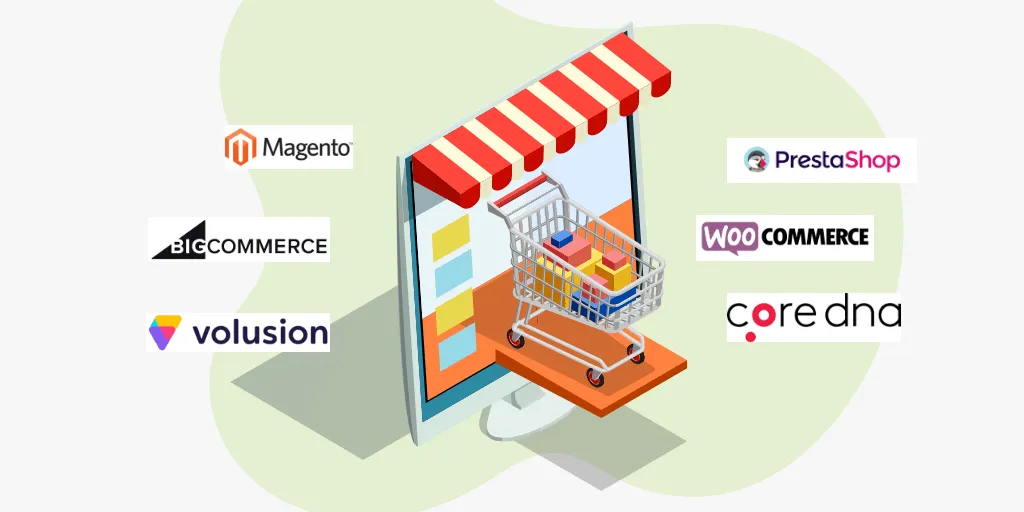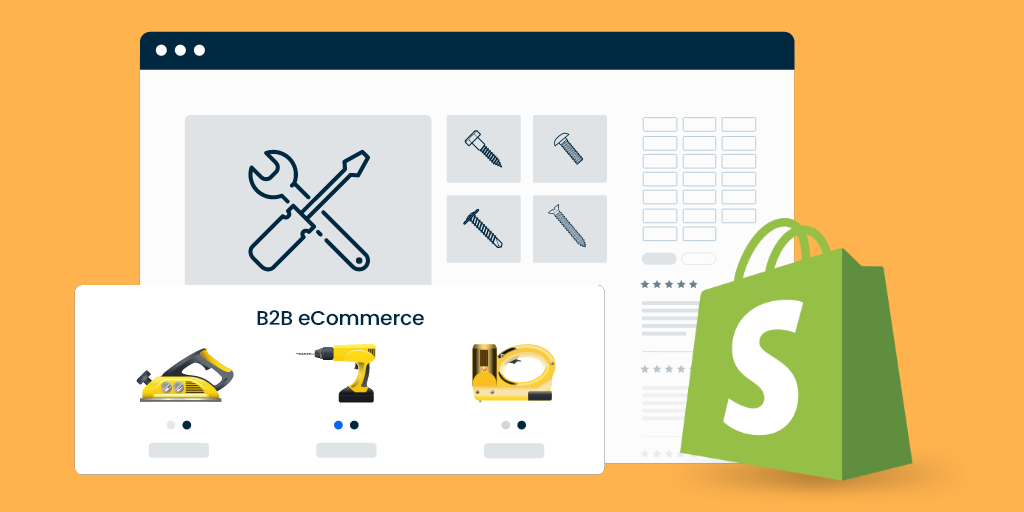Eight of the Best Shopify Alternatives You Can Try Out Today

Are you looking for Shopify alternatives for your online store?
In and of itself, Shopify is a really powerful eCommerce platform. It’s easy to use provided you know the technicalities involved. Nevertheless, if you are looking for a professional, you can always look for expert Shopify developers to do the job.
It offers everything you need – from shopping cart software to digital marketing tools, CRM integrations, support for multiple business functions, and more.
However, there are times when it isn’t the most feasible option.
For example, you might need a feature that’s not available on Shopify. Or perhaps the monthly recurring fee is well beyond your budget.
In that case, you need to look for some good Shopify alternatives to get your store up and running.
In this post, we’ll be giving you a run-down of all the major alternatives to Shopify.
How to Choose Shopify Alternatives
Before you choose to go with a Shopify alternative, the first thing you need to consider is your opportunity cost.
Oftentimes, people opt for one thing over another on a whim rather than careful research. Such a thought process only leads to headaches down the road.
To avoid that, you need to first and foremost, research your business requirements and which platform provides the best options for that.
If Shopify fulfills those requirements then by all means, go for it.
Questions You Need to Ask Yourself
Before proceeding further, there are plenty of attributes of an eCommerce platform that you need to look at. When you go about choosing an alternative, ask yourself the following questions:
- What type of hosting does the solution run on? Is it self-hosted, or do I have to deal with hosting as well?
- What’s the price of subscription and renewals for my intended platform?
- Is the platform provider good at providing help and support when it’s needed?
- What’s the percentage or amount deducted from my sales by the platform provider with each transaction?
- What’s the general popularity of the eCommerce platform? It’s community, among other things?
When you have an idea on what to do, you can get started with your eCommerce journey in no time at all.
Now that we know the considerations, it’s time to discuss some of Shopify’s most popular alternatives.
Let’s begin, shall we?
1. WooCommerce
Remember that point where we talked about Shopify being the fastest growing platform?
While there’s nothing wrong with that point, its growth has been phenomenal. But in terms of overall popularity, WooCommerce is ahead of Shopify. Check out these WooCommerce usage stats.
The reasons for its popularity extend beyond eCommerce. WooCommerce is built on top of the CMS giant WordPress. It has been the go-to option for users looking to build any kind of website.
With WordPress being the dominant force, anyone using the CMS can install WooCommerce. Best of all, they can set up a storefront in a matter of hours.
But WooCommerce’s popularity is not just attributed to WordPress. By itself, the plugin/platform hybrid has functionalities that set it apart.
Once you’ve set up your domain name and hosting, you can start selling on WooCommerce for free.
You can add products, customize your store, and even rank your website with ease when you have WooCommerce.
On top of that, there are no transaction fees associated with selling on WooCommerce.
Because of its open-source nature, you’re not limited to customizing your website. If you’ve got an in-house team or a website development partner, then you can create a website the way you want to.
But here’s where WooCommerce is not preferred by most.
From maintenance, security, updates, and other technical considerations – you have to take care of everything yourself.
If you’re a non-technical business owner looking to run a business rather than take care of such concerns, then selecting WooCommerce might warrant careful consideration.
Besides the issues we’ve already discussed, WooCommerce is a pretty robust platform and one of the prime Shopify competitors out there.
Get in touch with us if you need top-notch WooCommerce Development Services.
Read this in-depth comparison between Shopify and WooCommerce that can provide you with more detail on the differences and similarities between the two.
2. BigCommerce
A SaaS eCommerce solution, and is one of the closest Shopify competitors.
Launched in 2009, it’s a company that’s grown into a massive brand with its eCommerce platform.
It provides more functionality out of the box than other platforms. This allows business owners to start a professional and highly functional eCommerce store without needing external plugins, third party apps, and integrations.
It’s because of this cost-effective functionality that makes it different from other platforms. Another good thing about it is their focus towards innovation and partnerships.
Just recently, they partnered with WordPress to create their own checkout integration. This innovation is known as headless commerce, which is essentially using parts of an eCommerce platform on another platform.
The pricing is market competitive considering the number of features you get with the platform.
Read this detailed BigCommerce vs Shopify comparison.
3. Magento 2
When it comes to discussing the pioneers of the game and one of the fiercest of Shopify competitors, you can’t help but mention Magento.
It’s been present for a longer time than the others I’ve mentioned so far.
An open-source platform, Magento is one of the robust enterprise ecommerce platforms available today.
Similar to other big names in the industry, Magento doesn’t shy away from innovations. Magento 2 is testament to that fact. A major cloud offering for enterprises, magneto 2 has now made customers shift to the cloud.
From providing a CMS, to everything else needed to start up eCommerce operations without worrying about lags and scalability, Magento 2 is clearly the best option for professional business owners.
4. Core DNA
Core DNA is one of the newer players in the market and has gained quite a good reputation in the eCommerce world.
Combining CMS features with eCommerce, it is the closed source equivalent of WordPress. While that’s saying a lot considering it just came out, the platform looks similar, even though it’s not as functional as WooCommerce.
But here’s where the platform is better: its customization capabilities. Even though the platform is closed source, there’s a lot of legroom inside it to help you customize your offerings accordingly.
If you want to see how it works, check out the platform’s demo on the website.
5. Volusion
This platform has been a major industry leader in eCommerce long before Shopify or any other platform for that matter.
Founded in 1999, it has been providing its eCommerce platform to users for over two decades now.
Being a go-to option for small to medium sized businesses, Volusion has been a major force in the industry.
It’s a solid solution, similar to Shopify. The only problem is that it isn’t too keen on marketing, which is why it doesn’t have as many installs as the latter.
The primary example of this is that, like other hosted solutions, it takes care of all the maintenance, updates, and security, as well.
6. PrestaShop
Another powerful, open-source eCommerce platform. It’s an actively performing company with a huge community behind it.
Even though it’s a Shopify competitor, PrestaShop is not a hosted solution. You have to take care of everything on PrestaShop, similar to what you do on WooCommerce. The only difference is that it doesn’t require you to install a CMS like WordPress.
Another similarity PrestaShop has with WooCommerce is it’s integration and customization capability. You can customize just about anything on your website.
There’s always a takeaway to this: the primary benefit of this is that it allows you to gain customizability in your eCommerce store.
7. BigCartel
Big Cartel is another major competitor when we consider Shopify alternatives.
Now, it’s not an alternative per se seeing that the majority of its use is for small businesses. If you’re one such business, then you should consider BigCartel.
It has a simple interface and plenty of resources that can help you get up and running with starting your eCommerce business. It’s best if you just want to get a feel for the eCommerce world and don’t have scalability concerns on your agenda.
The only problem with Big Cartel is that it requires you have some level of coding knowledge. With the variety of features inside them, howevre, BigCartel is an ideal choice for small businesses.
Also Read: Shopify vs Big Cartel: Which is the Best eCommerce Builder in the Market?
8. Wix eCommerce

Essentially a CMS that lets you build an eCommerce website (or a general website) without having to write a single line of code, Wix is quite intuitive and modern in it’s approach to website development.
With its intuitive drag-and-drop interface, it can help you start an eCommerce website easily and quickly. Just pick your template, drag and drop your elements, and just hit publish.
Best part about Wix is that you get a feel for the product for free with its sub-domain.
Final Words
There are many considerations you need to take into account before selecting an eCommerce platform and for all the right reasons.
If you don’t weigh your choices before making a decision, you’ll end up with a platform that’s not suited to your business needs.
Hopefully with this guide, you not only learned about the top alternatives to Shopify, but also got a quick run-down of all the platforms.
We tried to keep this list as short as possible, because of that we missed out on the major platforms:
Read Also



